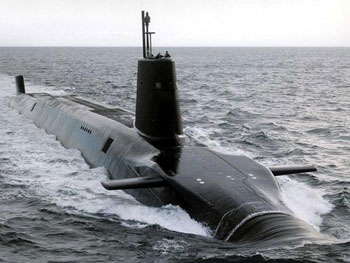-
 Photo: Wikicommons
Photo: Wikicommons
Scotland could invoke international law to block the UK government’s desire to maintain a nuclear arsenal, one of the world’s leading legal experts has stated.
In the run-up to the Campaign for Nuclear Disarmament’s 51st anniversary on February 17th, Judge Christopher Weeramantry, former vice-president of the International Court of Justice (ICJ), told an Edinburgh conference that while defence matters are reserved to the UK Parliament, the Scottish Parliament has international humanitarian and legal obligations that weapons of mass destruction violate.Weeramantry said: “Gross violations of international obligations aren’t excluded from the purview of the Scottish Parliament. The absence of power in the former area cannot cancel out its responsibilities in the latter.”
Weeramantry served as vice-president of the ICJ at The Hague when it delivered its 1996 historic opinion on the illegality of nuclear weapons.
The UK government’s plan to replace the Trident missile system could breach the Nuclear Non-Proliferation Treaty. Created in 1968 and ratified by 189 countries including Britain, the treaty has three ‘pillars’: non-proliferation, disarmament and the right to peacefully use nuclear technology.
A paper from Mohammed Bedjaoui, a former president of the ICJ, presented to the conference ‘Trident and International Law: Scotland’s Obligations’ says any “bolstering” of nuclear warheads would infringe the treaty’s disarmament stipulation.
This was echoed by British legal expert Phillipe Sands QC, author of a legal opinion for Greenpeace stating replacing Trident was likely to be against the law.
Westminster SNP leader and Foreign Affairs and Defence Spokesperson Angus Robertson opened the event.
“This conference underlines our commitment to a safer world by ridding ourselves of weapons of mass destruction. Majority opinion in Scotland is opposed to the Trident weapons system.
“The time is right to remove nuclear weapons from Scotland.”
The convention, organised by the Edinburgh Peace and Justice Resource Centre and the Acronym Institute for Disarmament Diplomacy among others, sought to place Scotland’s nuclear responsibilities within a larger international legal framework.
Janet Fenton of the Edinburgh Peace and Justice Resource Centre toldVeritas: “We are looking to encourage the Scottish government to look at the options from an international law and ordinary Scots law perspective. At the present time Scotland is taking all its advice from Westminster.”
Weeramantry also asserted that non-violent resistance to nuclear weaponry could be justified in international law.
“Anti-nuclear civil resistance is the right of every citizen of this planet. For the nuclear threat, attacking as it does every core concept of human rights, calls for urgent and universal action of its prevention.”
John Ainslie, co-ordinator of the Scottish CND, told Veritas: “It’s reassuring for someone with that legal status to reaffirm his line. He has a strong legal argument stating that not only threat or use of nuclear weapons is contrary to international law, but also the possession and deployment.”
The current Trident submarines will reach the end of their service life in 2024. While a 2006 White Paper ‘The Future of the United Kingdom’s Nuclear Deterrent’ argued for an eminent replacement, 161 MPs voted against the government’s motion to continue with a replacement in March 2007.
Fenton said: “The Scottish government has a clear anti-nuclear stance. It is also a view shared by the majority of elected representatives in Scotland, including MPs in Westminster. The majority of Scottish MPs oppose the replacement of Trident.”
Newly appointed Scottish Minister for the Environment Roseanna Cunningham said: “The Scottish Parliament has confirmed its opposition to plans for a new generation of nuclear weapons.
“Those around the world opposed to nuclear weapons are looking to Scotland to lead the way. That is a role we must fulfil.”
This comes as the UK Foreign and Commonwealth Office publishes its Policy Information paper ‘Lifting the Nuclear Shadow: Creating the Conditions for Abolishing Nuclear Weapons’.
Robertson said: “Scotland can help lift the nuclear shadow by deciding to end the presence of Trident weapons.”
Published in Veritas Issue 102 Wednesday February 18th, 2009
Leave a comment